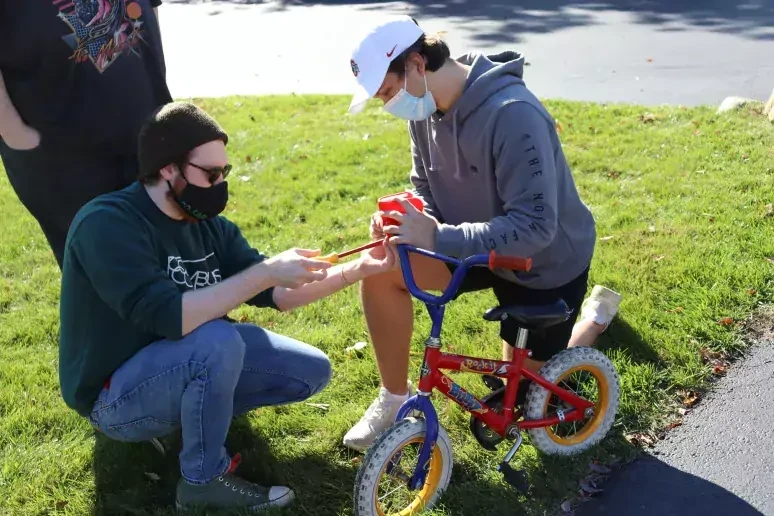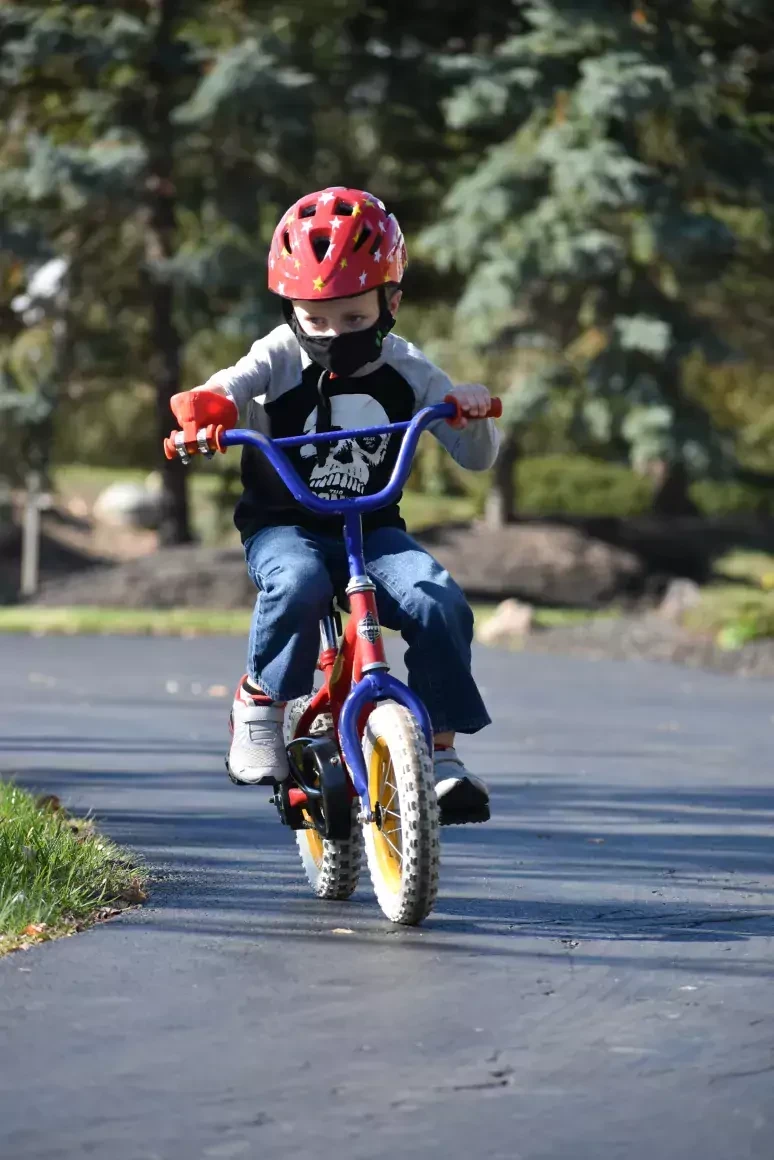CCAD students and alumni design life-changing prosthetics
As they sketched out prosthesis designs for a young boy at CO-FAB 2020, a team of students from Columbus College of Art & Design and other area schools initially went with a Spider-Man theme. After all, what 4-year-old doesn’t love Spider-Man? But once they got to know their recipient a little better, Team Jack changed course.
“He was pretty shy at first, but once Jack started coming out of his shell, he told us Captain America was his favorite superhero,” says Aaron Jeschke (Industrial Design, 2021). “You meet someone and you get that empathy of being with someone you don’t know. You don’t entirely understand their needs quite yet.”
It was just one of many real-life design lessons the designers came away with from CO-FAB, an experiential workshop that provides an opportunity for those with limb differences to work with designers, engineers, and change-makers to turn their ideas into prosthetics.
“Instead of working by myself in an studio, it was really about taking in new perspectives, trying new things, and collaborating with people I probably wouldn’t have collaborated with,” Jeschke says.

Designing for good
During a three-day workshop held Oct. 16–18, 2020 at Design Central in Columbus, three limb-different recipients ages 4, 8, and 9 were matched with groups of high school students, college students in majors like Industrial Design, Engineering, and Occupational Therapy, and industry professionals. The goal, explains Founder & CEO of Form5 Prosthetics Aaron Westbrook, is not only to build new prostheses for the recipients, but to empower them to imagine new possibilities of all the things they can do.
“Usually when you get a traditional prosthesis, you’re not as connected to the fabrication and ideation as to what it will look like and how it will function,” says Westbrook, an Ohio State student who was born with a limb difference. “Inclusive design opens their mind to what’s possible. They realize their capabilities. ‘Hey, I really wanted to have an attachment to go on my bicycle—now, what else can I do?’ It really unlocks their mindset.” CCAD alum Jonathan Hockaday (Industrial Design, 2019) compares the CO-FAB experience to a hackathon.
“Basically, you meet your recipient and then you have three days to make a prosthetic or a device to solve whatever problem they’re looking at,” says Hockaday, who participated in last year’s inaugural CO-FAB and returned this year to be part of Team Jack.

A 4-year-old’s dream
Team Jack was presented with the challenge of helping a 4-year-old to ride a bike. Once the designers met Jack and watched him, they quickly realized that he was already a fairly accomplished bike rider, says Assistant Professor of Industrial Design John Youger. What he struggled with was holding onto the handle and controlling his bike, and his parents wanted him to have more confidence while riding.
Team Jack ended up crafting a prosthesis that attaches to his handlebar, allowing Jack to rest his residual arm against the handlebar to better control his steering.
Working with occupational therapists helped the designers see the challenge in new ways. The therapists looked more at posture—how does Jack sit, how is he using his limbs, is he tilting to one side or the other?
“When we put our final concept on the bike for him to try out, he was very much evened out,” Youger says. “If you were looking at him from the back, you wouldn’t even know he had a limb difference. He’s just a kid riding a bike.”
Collaborating and empowering
Westbrook envisioned CO-FAB as a natural offshoot of Form5, the nonprofit organization he founded with a mission to empower people to successfully interact with their world and their future. The event stems from Form5’s core values of inclusivity and collaboration. His idea was to bring students and young people together to see what amazing things could be envisioned and created.
Westbrook was struck this year by something Jack’s mother said to him during the workshop: “Where would we be 20 years ago?”
“That resonated with me, given that I’m 21 years old,” Westbrook says. “I kept thinking, what resources were available to my parents back then? It’s amazing to think, going forward, how things like this will change what people think they’re capable of.”
The inaugural CO-FAB took place in 2019 over one three-day weekend, but this year’s event was stretched to last a few weeks. Participants met with families a few weeks prior to the workshop event and started plotting out ideas over video calls. Moving forward, Westbrook hopes to expand to offer more than one CO-FAB workshop each year to open the opportunity to more colleges and students to participate.
The beauty of an event like CO-FAB, Youger says, is that designers can prototype something, fabricate it, and see how it impacts a life all in one weekend.
“No matter how big or small, there are ways to change people’s lives,” Youger says. “By changing Jack’s life, you’re changing his life and he’s changing yours. We try not to lose sight of what they (this year’s recipients) did for us. It’s a ripple effect that transcends the event and becomes something bigger.”
CCAD Prepares Students For Careers
You can find our alumni using their creative skills in small businesses, multinational corporations, nonprofits, and even in such fields as banking, healthcare, and insurance.

